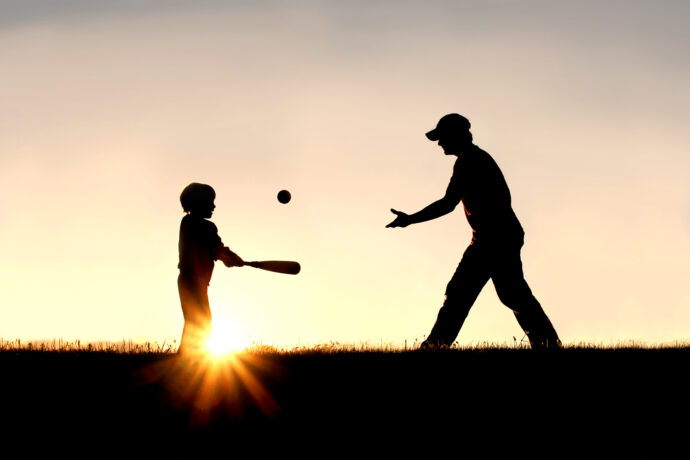In the late seventies, when I was around ten years old, I played softball very, very badly. It was the year of the Dorothy Hamill haircut, terrycloth jumpers, and The Bad News Bears. I honestly don’t remember how our whole team fared, but I remember my own stunning ability to miss every pitch that came my way across the plate. It was my first and last attempt at organized sports, unless you count one track season—because that was the one sport that never involved equipment.
Now, some years later, I am watching my son Charlie, ten, at the plate. His tiny frame fairly buzzes with tension, bat poised, eyes locked on the pitcher. And I find myself muttering under my breath, “Please. Please. Please.”
My two sons started playing ball when they were barely able to run the bases in the correct order. In fact, the first time Charlie hit the ball off the tee, he actually ran after his ball slowly rolling toward second base, picked it up and held it high over his head, and looked around to return it. He was proud. He was cleaning up after himself.
The first years of baseball were cute. I had pictures of Henry making a run for the base wearing a helmet so cumbersome and huge it seemed to propel him forward, like its own wrecking ball making for home plate. My own coaching abilities were layered in cuteness, like my repeated pleas to stop picking flowers in the outfield, until one small boy, grimy with dust and sweat, came up behind me during the second inning, tugged on my shorts, and squinted up at me with a snaggly dandelion in his hands. “For you, coach. It’s pwetty,” he said. In that moment I contemplated trading that kid out for one of my own because of the cuteness, but that would have probably made things a bit awkward at the end of the game.
It was a peaceful time. A happy time. And, as is often the way with parenting, it was a very short time.
This year, our team has played in four weekend tournaments, as well as regular seasonal play. Out of all these competitions, we have two wins. Two. The rest of the games have resulted in scores that were so monumentally unbalanced that one could visualize our team as the Titanic, tilting crazily and disappearing into the icy sea no sooner than you could shout, “Play ball!”
On this night, as I watched my son standing at home plate, I prayed. I have to admit it, I just prayed that we could have a hit. And, since God is good and faithful, Charlie made contact with a solid THWACK! and I stood up and shrieked. The bullpen stood up and shrieked. Charlie would have too, if he had not been running so hard. Then, the shortstop swiftly fielded the ball and tossed it nonchalantly to first base and Charlie was called out.
It just made me want to howl.
Charlie trudged back to the pen as his team sank back to their seats dejectedly. It was wretched.
Later that night as we packed our tired and dusty selves into the car, along with our usual eighty pounds of equipment, both my husband and I tried to rally. “You know, you boys really did great!” gushed Brian. Both boys regarded him glumly. “No, really! You did! Really great!”
Charlie, ever the doubting Thomas, tilted his head to the side a bit and narrowed his eyes. “But . . . we lost. Again. And we had mess-ups all over the place. Dad, it was awful.”
Brian searched through his repertoire of Encouraging Things to Say, and came up with this gem: “Well, you can always learn from it for next time!”
I turned toward them and added, “Listen, you did what your coaches said. You followed instructions. That’s gonna pay off one day. You just need to do what Coach tells you—and hope.”
From the backseat, a small voice from Henry: “I don’t like hope.” I looked back at him. He shrugged. “I want to know it’s going to work. Not hope.”
He’s right. Hope’s batting average is pretty . . . average. But that, I think, is the whole point.
Brian explained, “Sweetie. All you need to do is what the coach told you to do. That’s your job. The rest is out of your control. The hope part is a nice side effect because eventually it will pay off with some great plays, but for now, the real benefit is just do what you’re told and trust the coach. Just trust the coach. The hoping part is not really part of it. The trusting comes first. Hoping comes later.”
I found that hope is simply another name for actively trusting.
I became silent. So often my faith is wrapped by the tightly held fist of hope (or, what I thought was hope) when really, all along, I found that hope is simply another name for actively trusting. Trust the Coach. Do what he says. Whatever the score.
Every day, our faith is tested. It’s the nature of the game. We have doubts, mess-ups, we drop the ball. We come up short. And if we try to rally hope in the confusion in our world and even our own fallible selves, we will tire.
But trusting the goodness and power of our God over all of it is hope. Hope is trust in action.





0 Comments